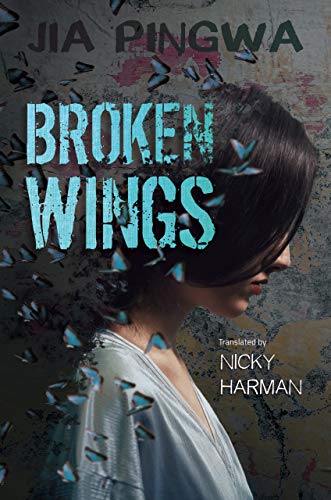Twenty-year-old Butterfly is
kidnapped and taken to a remote village to be the wife of Bright Black, a farmer/shopkeeper
who keeps her captive in his cave home. All
the villagers are complicit because they know how she came to be in the village
and are aware of her imprisonment. Narrated
by Butterfly, the novel focuses on her struggles with her situation; she is
determined to find a way to escape or be rescued.
China’s one child policy has resulted
in a gender imbalance as more male children than female children were born; now
young men are having difficulty finding wives.
Apparently bride kidnapping has recently resurfaced in some parts of
China. In many cases, women are
kidnapped and sold to men in poorer regions of the country. This is what happens to Butterfly. In an afterword, the author mentions that her
story is based on what happened to the daughter of a neighbour in his home
village.
Obviously, the reader will feel
sympathy for Butterfly. She is tricked
and taken far away from her mother, her only family. When the book opens, she has been held 178
days. The villagers come and gawk at her,
but no one helps her since capturing a bride seems to be an accepted practice. Bright Black is not the only one who has
purchased an abducted woman because “there were plenty of men in the village
and a dozen or more were wifeless, ‘bare branches’ as they were called.” There is a strong desire to continue the
family line: “Bright’s dad was scared
stiff that his son would never marry . . . and the family would die out.” It is expected, therefore, that Butterfly is
raped so she can ensure the continuation of the Black family.
Butterfly is brutalized but it is
obvious that the author also wants the reader to have some sympathy for Bright
as well. He is not totally evil. There are several instances of his caring and
compassion for Butterfly. He buys special
food for her such as steamed wheat buns; “There were always plenty of soybeans
left, and I knew he’d saved them for me.”
When Butterfly is experiencing great pain, Bright says, “’I won’t say
anything, you scream and swear all you like if it makes it hurt less.’” In the Afterword, the author writes about the
“barbarous practice of snatching women” but he also bemoans that “The recent
transformation of China has led to the biggest migration of people from the
countryside to the city in history. . . . In remote backward areas, the men who
lack the ability, the skills or the funds to leave, are left behind in the villages
to scratch a living on the land. They
have no possibility of marrying. . . . no one mentions the fact that the cities
have plundered wealth, labour power and women from the villages. No one talks about the men left behind in the
wastelands to wither like gourds on the frame, flowering once, then dying
fruitless.”
The book is written in a
detached, unemotional style which is unusual and unexpected because Butterfly
is the narrator. Her emotions, for
example, are not described in great detail.
When she is raped, she has an out-of-body experience; her spirit leaves
her body and she describes only what she sees being done to Butterfly. The author explains that he cannot write “violent,
extreme narratives” and, instead, compares his writing to “ink-wash paintings”
whose essence lies in “the ‘suggestion’ rather than the detail.”
There are many minor characters,
most of whom are known by their nicknames:
Blindy is Bright’s blind uncle; a stutterer is called Tongue-Trip; and a
woman who suffers from acne is addressed as Auntie Spotty-Face. These names often seem callous and
offensive.
The character who seems most
respected is Great-Grandad who tries to teach Butterfly to make the best of her
situation. He advises her to “’Just pick
out the good [beans]’” and tells her, “’if you treasure something precious, it’ll
last longer than plastic, wood or iron.’”
He always tries to see the positive; when a man is teased that he can’t
see heaven, Great-Grandad says, “’Well, heaven’s looking at him.’”
Over time, Butterfly seems to
adopt Great-Grandad’s attitude because she makes observations like “it was only
by meeting people halfway that you could grab an opportunity and gain some
momentum from it, and then everything went easy” and “The stones anchoring the
fleeceflower root stayed put – they couldn’t grow roots or wings, they just got
covered in muddy water but they didn’t complain, did they?”
There are sections of the book
where focus is placed on things that seem irrelevant. For instance, Butterfly mentions that she has
learned how to make corn pudding and then describes the process in great detail;
the making of buckwheat noodles follows; and then there’s a lengthy section
describing the many ways potatoes are eaten.
Surely all of this information is not needed just to show that she is
adapting to life in the village?
This book did not always keep my
interest. The dispassionate style just
doesn’t feel natural given the subject matter.
Dialogue sounds robotic and there are even strange non-sequiturs: “Then, after Padlock’s wife got stung to
death by hornets, Good-Son made up his mind to leave and get a labouring job in
the city.” What’s the connection between
the death of one man’s wife and another man’s decision to leave the village for
the city?
Jia Pingwa is apparently one of
China’s most popular writers, so I looked forward to reading this book. Unfortunately, though it addresses an
important issue, the novel is not a compelling read.
Note: I received a digital galley of the book from
the publisher via NetGalley.

No comments:
Post a Comment